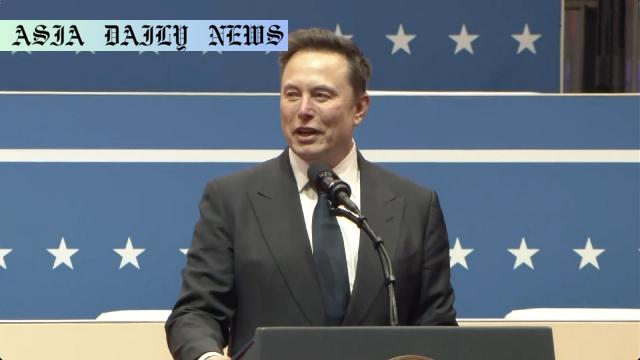Elon Musk questions the viability of Donald Trump’s ambitious $500B AI infrastructure project while clashing with Sam Altman.
Elon Musk challenges the feasibility of a $500B Trump-backed AI initiative.
Musk claims SoftBank lacks sufficient funds to execute the project.
OpenAI CEO Sam Altman defends the project as beneficial to the U.S.
Musk and Altman reignite their longstanding conflict over OpenAI strategies.

An Ambitious Plan: The Stargate AI Initiative
Earlier this week, former U.S. President Donald Trump announced a groundbreaking initiative, Stargate, a joint venture partnered by SoftBank Group, OpenAI, and Oracle. Pledging $500 billion over four years, the initiative aims to build advanced AI infrastructure in the United States. Trump framed the project as a pivotal move to position the U.S. as a leader in artificial intelligence, countering growing competition from global players such as China.
However, this monumental plan soon became the center of controversy, stirring skepticism among influential voices in the tech world, including Elon Musk.
Musk’s Skepticism
Elon Musk, CEO of Tesla and SpaceX, took to the social media platform X to express doubts about the feasibility of the Stargate project. Musk pointedly remarked, “They don’t actually have the money,” insinuating that SoftBank, one of the project’s key partners, has fewer than $10 billion secured for the venture. This remark came as a shock, especially as Musk himself has been a strong proponent of AI but expressed concerns about potential mismanagement and overreach in ambitious projects.
Sam Altman’s Response
The skepticism from Musk prompted a sharp response from OpenAI CEO Sam Altman. Defending the initiative, Altman rebuked Musk’s comments as unfounded and called the project an extraordinary opportunity for the United States. Altman also suggested that Musk’s criticism was influenced by personal motives, implying that the project might conflict with Musk’s existing ventures in AI infrastructure and technology development.
Clashes Among Founders
The exchange between Musk and Altman highlights a longstanding division between the two figures. Once collaborators in the formation of OpenAI, Musk and Altman have since parted ways over differing visions for the use and governance of artificial intelligence. Musk has since founded his own rival AI venture, which took a different strategic path than OpenAI, sparking a series of public disagreements.
Concerns About Funding
The larger issue surrounding the feasibility of Stargate rests on its reported budget of $500 billion. Critics, including financial experts, have questioned whether the figures presented align with realistic funding capacities. While SoftBank has been a prominent investor in technological innovations, its recent public financial disclosures have left some analysts concerned about its liquidity.
Geopolitical Implications
Aside from economic considerations, the Stargate initiative comes at a critical time when countries are racing to lead advancements in artificial intelligence. The United States faces significant pressure to counter China’s growing dominance in AI research and deployment. Stargate’s success or failure could have massive implications not just in the tech industry but also in terms of geopolitics and global competitiveness in the field of AI innovation.
A Broader Conversation on AI Governance
While the focus now is on funding and logistics, the larger narrative revolves around the governance of AI technologies. The Stargate project intends to set new benchmarks for ethical AI deployment and infrastructure, which could shape global standards for years to come. Critics and proponents alike agree that such ventures demand a balanced approach, ensuring not only the pace of technological development but also safety and public trust.
The Road Ahead
As the spotlight remains on Stargate and the figures behind it, the conversation raises essential questions about the intersection of politics, tech innovation, and international competition. Whether the Stargate initiative succeeds remains to be seen, but it has undoubtedly ignited a necessary discourse on the future of AI and its place in the global economy.



Commentary
An Intriguing Conflict of Ideas
The recent clash between Elon Musk and Sam Altman over Trump’s ambitious Stargate AI project reveals more than just contrasting opinions. It underscores deeper issues, such as the differing ideologies on managing cutting-edge technology and the role of funding in large-scale ventures. This public debate highlights the intense scrutiny large AI ventures face, particularly those involving government backing and private partnerships.
Heightened Stakes for U.S. AI Leadership
America’s stake in the AI race is extremely high, especially as countries like China consistently advance their capabilities. Stargate represents a bold move to reclaim leadership in this industry, but it’s clear that economic uncertainties and competing corporate interests could stymie its progress. Musk’s voice adds weight to the argument for transparency and financial feasibility in large-scale AI initiatives.
Ensuring Ethical and Collaborative Innovation
Ultimately, while Musk’s critique may seem pointed, it brings to light critical questions: Is this venture being managed wisely? Are the right stakeholders involved? And beyond profitability, are we doing enough to ensure AI is developed safely and ethically? These considerations should be top of mind for everyone, from governments to private individuals, as the Stargate initiative unfolds.